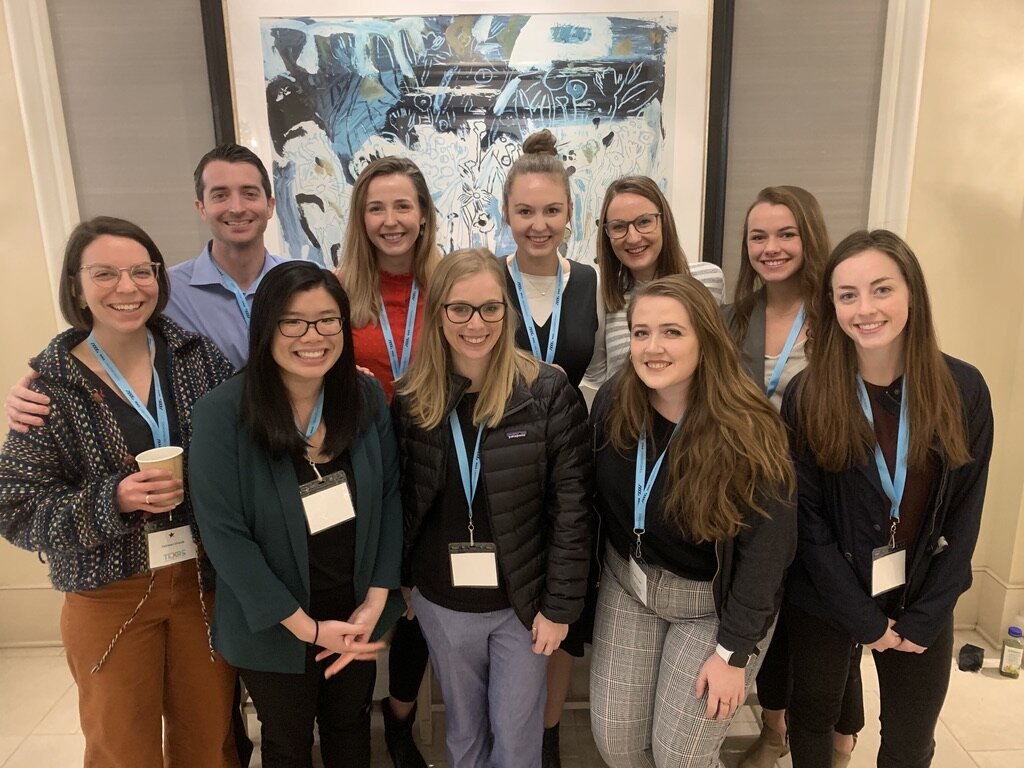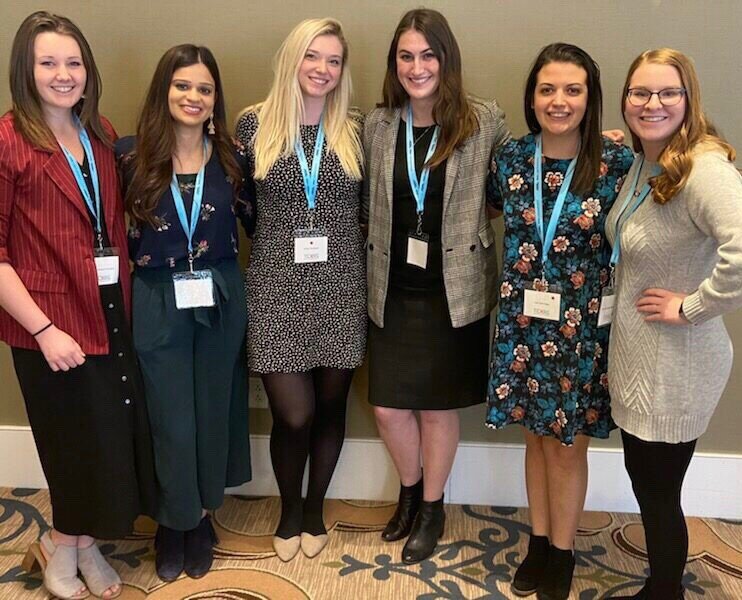Prospective Students
Are you considering a career in genetic counseling? Genetic counseling is an exciting and competitive career field. Here are some answers to frequently asked questions, tips for applying, and where to get useful information regarding the training required to become a genetic counselor. Future students can also join our mailing list to stay apprised of these events by becoming a member of TSGC.
TSGC hosts an annual webinar in the fall for prospective students who are interested in a career in genetic counseling.
You can view the 2021 webinar here. Please check the Events page for future webinars and other educational opportunities.
TSGC Mentorship Program for Underrepresented Prospective Students:
TSGC has a mentorship program dedicated to providing prospective students who identify as an underrepresented minority with formal mentorship. Eligible students should either plan to apply to a Texas genetic counseling program or be a prospective student from Texas. Applicants must be applying in the most current application cycle. Applications to this program are open from July to August and the mentorship program typically begins in September and runs through May.
To apply for this mentorship opportunity you must:
Identify as an underrepresented minority, be applying in the current genetic counseling program application cycle and be a current Texan or planning to apply for a Texas genetic counseling program (University of Texas at Houston, Baylor College of Medicine, and/or UT Southwestern).
Please email tsgcdei@gmail.com if you'd like more information about this program.
How do I become a genetic counselor?
You are required to complete two years of graduate training in a Master’s-level program that has been accredited by the American Board of Genetic Counseling (ABGC). Following completion of a training program, certification in genetic counseling is offered by the ABGC through an examination offered on an annual basis. By passing this examination, you are considered a certified genetic counselor (CGC).
Some states also require licensure for genetic counselors. Licensure is different from certification; certification is a professional designation provided by a credentialing board (ABGC) that identifies as an individual as meeting educational and examination standards. Licensure is regulated by a state board or agency and protects the integrity of the genetic counseling profession. To learn more, please check out Licensure on the main TSGC site.
How do I find genetic counseling programs?
There are currently over 50 genetic counseling programs in the U.S. and Canada. A full list can be found on the Accreditation Council for Genetic Counseling (ACGC) website at http://gceducation.org/Pages/Accredited-Programs.aspx. Additional helpful information is available through the Prospective Students link that can be found on the National Society of Genetic Counselors (NSGC) website at http://www.nsgc.org.
The ABGC website (http://www.abgc.net/) is also a very useful resource for finding out more information about accredited genetic counseling programs. There is also a link dedicated to information for future students, including career and certification information.
Are there genetic counseling programs in Texas?
Yes! There are three ABGC-accredited programs in Texas. For more information about these programs, you can visit their website, attend an information session, or reach out to one of the program directors:
Univeristy of Texas Genetic Counseling Program
Website: https://gsbs.uth.edu/genetic-counseling/index.htm
Claire N. Singletary, MS, CGC
Program Director
713-500-5760
Claire.N.Singletary@uth.tmc.edu
Meagan Choates, MS, CGC
Assistant Program Director
Baylor College of Medicine Genetic Counseling Program
Website: www.bcm.edu/gcp
Dan Riconda, MS, CGC
Program Director
713-798-4569
daniel.riconda@bcm.edu
Salma Nassef, MS, CGC
Associate Director
713-798-8625
nassef@bcm.edu
UT Southwestern Genetic Counseling Program
Website: https://www.utsouthwestern.edu/education/school-of-health-professions/programs/genetic-counseling/
Email: UTSWGCP@UTSouthwestern.edu
Samantha Greenberg, MS, MPH, CGC
Program Director
Caitlin Mauer, MA, MS, CGC
Assistant Program Director
What makes a competitive candidate for a genetic counseling program?
Programs typically consist of 4-10 students per class. They can be both smaller and bigger. To stand-out in the application process, it is beneficial for a candidate to have experience through shadowing in the field or related volunteer work. You can find a genetic counselor in your area by going to the NSGC website and filtering by genetic counselors who are open to student contact: https://findageneticcounselor.nsgc.org/. These genetic counselors can be asked about opportunities to become involved with shadowing or interning. Experience in client advocacy can also be beneficial. Examples include working/volunteering with a crisis hotline or Planned Parenthood.
All applicants must take the General Test of the Graduate Record Examinations (GRE). A Subject Test of the GRE may be recommended but not required; this is dependent upon the specific program. A GPA of 3.0 or greater is required. Successful applicants generally have a GPA of 3.5 or better and GRE scores in the 75% range. However, in general genetic counseling programs consider the entire application when selecting applicants to interview. The following undergraduate or graduate coursework is strongly recommended:
- Biology
- Psychology
- Genetics
- Chemistry
- Biochemistry
- Calculus
- Statistics
Many programs offer informational sessions. This can be a great opportunity for networking or finding out more information about the programs to which you are considering applying.
Application materials for the following fall semester are typically due December, January, or February. Specific information regarding deadlines can be found on the program websites.
An interview is required as part of the application process at the majority of programs. Interviews take place in early spring and final notification of admission to the program is done on the same day as all of the genetic counseling programs in the United States.
Also on the “Career” drop-down menu is a link entitled “How to Become a Genetic Counselor.” This has more thorough information about the profession and the application process.
Where can I find more information about applying?
Program directors at each individual program are a great resource for your questions. Their contact information should be available through their program’s website.
The NSGC, ABGC, and AGCPD websites also have a lot of information about certification, accreditation, and the career of genetic counseling in general:
NSGC
http://www.nsgc.org
ABGC
http://www.abgc.net
AGCPD
https://agcpd.org/prospective-students/
Genetic Counseling Admissions National Match
https://natmatch.com/gcadmissions/index.html
Are there educational conferences I can attend in Texas?
TSGC hosts an annual education conference, which is open to prospective genetic counselors. Check back to our website for most up to date information regarding this conference and other upcoming education events.
What other learning opportunities are available for prospective students?
There are various programs across the country that offer internships, workshops, and mentoring opportunities for prospective students. Educational programs afffiliated with genetic counseling programs can also be helpful in learning more about the respective program. Below is a list of some options, with those in Texas or with virtual options in bold. Check their websites for details.
- Baylor College of Medicine Genetic Counseling Career Intereset Workshop - Website
- Boise State Prospective Genetic Counselor Guidance Program - Website
- Color Genetic Counseling Immersive Program - Website
- Genome Medical Pre-Genetic Counseling Online Workshop - Website
- Georgia Association of Genetic Counselors Genetic Counseling Camp - Website
- Greenwood Genetic Center Summer Internship - Webiste
- Iowa Institute of Human Genetics Summer Internship in Genetic Counseling - Webiste
- Northwestern University Genetic Counseling Summer Experiential Workshop - Website
- University of South Carolina Genetic Counseling Summer Internship - Website
- UPenn Genetic Counseling Internship - Website
- UT Southwestern Cancer Genetics Program - Website
Does TSGC offer scholarship opportunities?
Please check back for future scholarship opportunities.
The TSGC Diversity, Equity, and Inclusion (DEI) Task Force is currently offering application and National Matching Services fee reimbursements to Black and African American applicants to Texas genetic counseling programs. Please visit the TSGC DEI page for more information.


